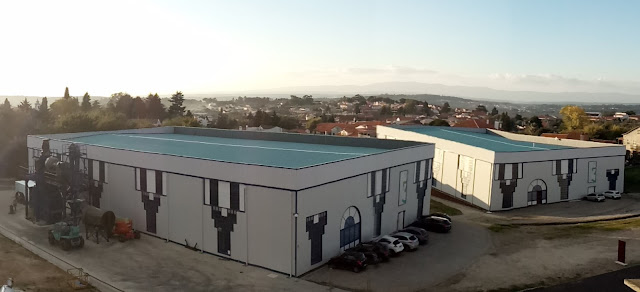Centro Bio - A model of sustainable growth for rural regions
Rural development and bioeconomy will be increasingly
interconnected in the near future. A biomass based production paradigm represents
a golden opportunity for agro-forestry areas to ensure a growth model with
significant economic and societal benefits. The Centro Region in Portugal has
recognize that chance and it is moving forward. The Centro Bio project of BLC3 is
the clear evidence. It is a technology and innovation campus focused on the
implementation of a progress model for rural regions with low population
density that sources fuel and raw materials in a sustainable way, creates new
jobs and businesses and preserves the area’s natural beauty. The project is the
newly winner of the 2016
RegioStars Awards in the category of “Sustainable Growth”, therefore, I
think it will be interesting to find out more about it.
Figure 1. Partial view of the Campus of Technology and Innovation Centro Bio (Courtesy of BLC3) – Technology Centre “Biorefineries” (right) and Technology Centre “Bioindustries and Bioproducts” (left)
Key information
Title
|
Centro
Bio: Bio-industries, Biorefineries and Bioproducts
|
Coordinator
|
|
Infrastructure
type
|
Campus of
Technology and Innovation (CTI) with 3.8 ha and 4 modules:
1. Technological
and innovation centre
2.
Support centre for innovative projects and ideas
3.
Incubation centre for business ideas and companies
4.
Industrial acceptance areas
|
Approach
|
Centro Bio works with researchers, local
farmers, foresters and entrepreneurs to develop new industries from
by-products, improve businesses efficiency and train future scientists and
entrepreneurs.
The core of the approach is the concept of “Bioeconomy
and Smart Regions" based on the methodology of Industrial Ecology
applied to the progress of industrial and regional symbioses.
|
Scope
|
Core pilot
territory: Central region (Anchor Region).
The
centre plans to link up with two more regions for a wider “smart region”: North
and Alentejo (Setpoints Regions).
The anchor
region is rural with low population density and high logistical problems
(mountain region).
|
Entity
type
|
Non-profit
association (private), with the aim to invest all the income flows to promote
the circular economy in the target regions.
|
Duration
|
22/04/2014
– 28/09/2015
|
Budget
|
EU funds:
2.64 M€ (European Regional Development Fund).
National
private: 0.52 M€.
Total
cost: 3.16 M€.
|
Key objectives
The project was focused on the achieving of the
following key objectives:
1. Creation of a new organizational model and
an umbrella-type infrastructure, with a network of excellence in R&D
knowledge/business.
2. Building a biorefinery pilot plant (100 kg/h
of agroforestry and urban wastes) for replication throughout the country.
3. Development of new products and value chains
linked to the valorisation of mass flows from different activities.
4. Establishing of an incubator specialized in bioeconomy,
circular economy, ecodesign and energy efficiency.
5. Generation of industrial and regional symbioses.
6. Cultural evolution and knowledge
transference: Lab-iDUCA (associated with schools) and OPERA4KIDS.
Impacts
These are the current impacts in the anchor
region:
- Investment: 9.2 M€ (public and private).
- Awards: 2 international excellence awards for the incubator (World Top 25: Top University Business Incubator, #22; Europe Top 10, #9) and 1 national (#2 national level, European Enterprise Promotion Awards, category: supporting the development of green markets and resource efficiency). Winner of the 2016 RegioStars Awards, category: sustainable growth).
- R&D: 24 complementary subprojects of R&D (6 with enterprises).
- Employment: 52 high qualified jobs.
- Intellectual and industrial properties: 5 national patents (2 approved / 3 pending).
- New business models: 4 spin-offs and 6 start-ups.
- Culture and Society: involvement of 2,360 young people (6-18 years old).
And these are the expected impacts in the setpoint
regions:
- Replication of the industrial biorefinery demonstration unit.
- Investment: 9.62 M€.
- Generation of an annual income from 2.88 to 4.30 M€ and over 70,840 jobs (an average of 230 per City Hall).
- Decrease of fossil resources dependence (potential around 72-99% through the valorisation of mass flows from agroforestry + urban sectors).
- Reduction of forest fires negative effects.
Acknowledgements:
I would like to express my appreciation to João Nunes and Susana Pereira from
BLC3 for providing me with information about Centro Bio.




